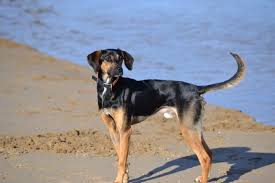
Greek Harehound
Conditions of detention
Greek Harehounds thrive in rural or suburban settings where they have plenty of space to exercise. They are not well-suited for apartment living due to their high energy levels and need for regular activity.
Useful Fact: A large, securely fenced yard is ideal for Greek Harehounds, allowing them to run and explore safely.
Nutrition and diet
A balanced diet consisting of high-quality dog food, tailored to their age, size, and activity level, is essential for the Greek Harehound.
Useful Fact: Feeding them twice a day can help maintain their energy levels and prevent digestive issues.
Health
Greek Harehounds are generally healthy dogs but can be prone to certain conditions such as hip dysplasia, ear infections, and bloat.
Useful Fact: Regular veterinary check-ups, a healthy diet, and proper exercise are crucial to maintaining their health and well-being.
Grooming and care
The Greek Harehound has a short, dense coat that is typically black with tan markings. Grooming is relatively simple, requiring a weekly brush to remove loose hair and keep their coat healthy.
Useful Fact: Regular ear cleaning is important to prevent infections, especially given their active nature and outdoor lifestyle.
Education and training
Greek Harehounds are intelligent and eager to please but can also be independent and stubborn. Positive reinforcement training methods work best.
Useful Fact: Early socialization and consistent training from a young age are key to ensuring good behavior and managing their independent streak.
Toys and entertainment
Interactive toys, chew toys, and scent-based games are great for keeping Greek Harehounds mentally stimulated and entertained.
Useful Fact: Engaging in activities that mimic hunting, such as scent trails and fetch games, can satisfy their natural instincts.
Safety
A secure yard and a leash during walks are important to prevent them from wandering off in pursuit of interesting scents.
Useful Fact: Microchipping and proper identification on collars are essential for their safe return if they get lost.
Accessories
Durable collars, leashes, and harnesses are necessary for handling their size and strength. Comfortable bedding and appropriate travel crates are also beneficial.
Useful Fact: Reflective accessories can enhance visibility and safety during nighttime walks.
Socialization
Early socialization with other dogs, animals, and people is crucial to develop a well-rounded temperament. Greek Harehounds are generally friendly and enjoy companionship.
Useful Fact: Regular exposure to different environments and social situations can help prevent shyness or aggression.
Travel and Transportation
Greek Harehounds generally travel well, especially if accustomed to car rides from a young age.
Useful Fact: Secure travel crates or dog seat belts are recommended for safe and comfortable transportation.
Behavior and psychology
Known for their friendly and loyal nature, Greek Harehounds are also independent and require mental and physical stimulation to stay happy.
Useful Fact: Regular exercise, mental challenges, and positive social interactions contribute to their overall well-being and prevent boredom.
Legal aspects
Owning a Greek Harehound may be subject to local pet laws and regulations, including licensing and leash laws.
Useful Fact: Being aware of and adhering to local regulations ensures responsible pet ownership and avoids legal issues.


